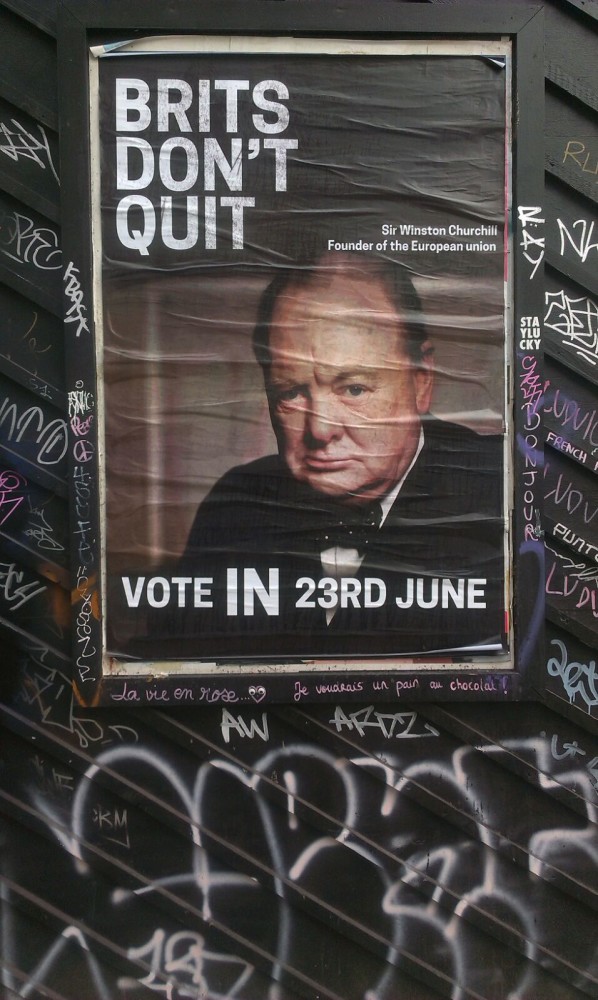The ‘Brexit debate’ about whether the UK should vote to leave the EU on 23 June has been dominated by right wing voices. The ruling Conservative Party and the billionaire-owned mass media have gone to war with themselves, crowding out left wing narratives. Yet a vibrant left wing debate has been taking place, albeit mostly outside of the spotlight.
The Labour Party is largely supporting Remain, but its contribution to the debate has been subdued. This is partly because of fears of what would happen if the party more openly debated both sides of the referendum. A unified Labour Remain platform is seen by some as a way of preventing Labour from descending into the civil war raging on the Tory benches.
Yet party leader Jeremy Corbyn’s support for the Remain campaign has been criticised as lacklustre and insincere. An ‘Old Labour’ tradition continues to be highly critical of the EU, with veteran Labour MP Dennis Skinner recently coming out in favour of Leave.

Left Remain
Left Remain campaigners emphasise EU-derived workers’ rights relating to maternity leave, sick pay, and working time as a reason to stay. Leaving the EU, especially at this time, would result in a ‘bonfire’ of workers’ rights, they say. Brexit would leave a poorly organised trade union movement at the mercy of a Tory Government unconstrained by EU regulation.
Preserving free movement of workers also figures highly on the left Remain agenda. They maintain that migration from EU states is good for people seeking a better life, and has created deep cultural and political ties across national boundaries. A vote for Brexit would contribute to a growing atmosphere of racism and xenophobia.
Left Remainers also emphasise the value of EU funding. In particular, Northern Irish voters are concerned for the future of high profile peace and reconciliation projects in the ‘six counties’ that would be called into question in the event of a Brexit.
Left-exit or ‘Lexit’
Like the Remainers, the Lexit campaign has focused on workers’ rights. Lexiters suggest that the EU has undermined and dismantled workers’ collective bargaining rights. They maintain that the Court of Justice of the EU consistently prioritises the rights of capitalists over workers. Workers’ rights are the result not of EU fiat, they say, but of political struggles and workplace organisation that has achieved legal recognition in UK legislation like the National Minimum Wage Act 1998.
The left’s desire to leave the EU derives from a growing politics of internationalist opposition to austerity. Lexit campaigners view the EU as inhibiting socialist governments through laws that prevent ‘state aid’, enforce competition, and limit public spending and borrowing. The Greek and Irish economies were savaged by EU-imposed austerity. Many suspect that Rajoy’s right wing Spanish government has been spared from implementing similar austerity measures, at least until after a left wing government is elected on 26 June this year.
Left leavers are concerned about anti-immigrant sentiment and are disturbed by the racism and xenophobia of the mainstream leave campaign. Yet many view EU free movement as forcing workers into competition with each other, resulting in a race to the bottom that undercuts wages and working conditions.
Instability and Reform
While Remain have pointed to the inevitable political and economic instability that would follow a Brexit, Lexiters suggest that this instability is the necessary condition of reconfiguring the economy after 35 years of neoliberal consensus.
Brexiters of all political stripes have sought to suggest that the EU is beyond reform. They emphasise the EU Parliament’s lack of legislative initiative as a symptom of the general lack of democratic accountability afflicting the EU’s seven institutions.
Left Remainers counter that the EU has mechanisms for reform, and that campaigns like Yanis Varoufakis’ Diem25 movement are the progressive way to oppose EU-imposed austerity.
Common Concerns
The left has been much better than the right at maintaining a degree of unity even as it has rigorously debated Brexit. The left needs to continue to engage critically with the principled, socialist cases for both leave and Remain. Regardless of the referendum result on 23 June, the left will need to unite in fighting to define the political economic discourse and to defend migrants and workers.
Franck Magennis is a trainee lawyer and community activist living in Deptford, London.